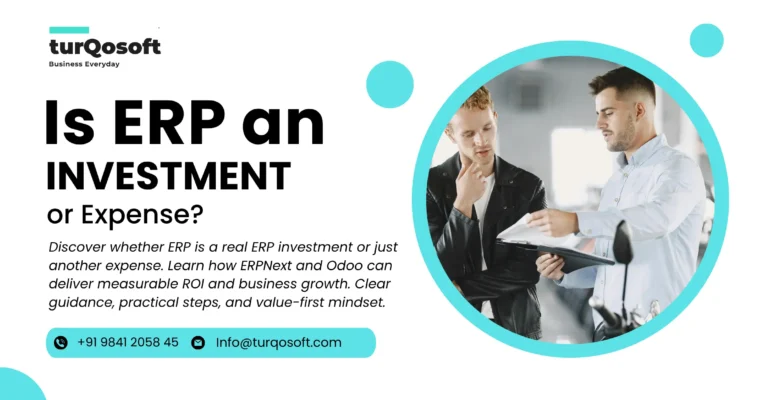Is ERP an Investment or Expense?

Let’s be real: ERP feels like a giant Excel sheet… that costs ₹10 lakhs
You’re running a business in India. You’re juggling GST, TDS, staff attendance, vanishing stock, and one accountant who might quit if you send one more WhatsApp invoice screenshot.
And now someone says, “You should consider an ERP investment.”
You’re like: Another software? Is this a smart move or just another bill?
That’s the real question.
So let’s break it down—plain, simple, and jargon-free. Because at Turqosoft Solutions, we’ve watched this debate unfold in boardrooms, factories, and anywhere business talks take place.
This article will help you finally decide:
-
Whether ERP is a money pit or a smart bet
-
How to view ERP not just as a tool but as a strategic ERP cost justification
-
Why timing, people, and mindset matter more than features
Let’s cut the fluff and get to the facts.
What is ERP? (Without the MBA Jargon)
ERP = Enterprise Resource Planning.
Still confusing? Here’s the real talk:
It’s one system that connects your sales, stock, accounting, HR, CRM, and more—without needing 14 Excel files and 5 daily follow-ups.
Whether it’s ERPNext or Odoo, think of ERP as the brain of your business. Right now, most companies run like they have ten departments with ten different truths. ERP pulls it all together.
If you want a solid breakdown of what ERP actually includes, check out Investopedia’s ERP guide for a deeper dive (in plain English).
Is ERP an Asset or Liability?
Technically, ERP is an expense.
You pay money for:
-
Implementation
-
Training
-
Support
-
Setup
But here’s the catch:
So does opening a new office.
Or hiring a senior manager.
Or upgrading your factory systems.
Do we call those expenses? Not really.
We call them investments—because they pay you back.
Need more convincing? Read this Harvard Business Review article on IT as a strategic investment.
Think of ERP Like This
You’re not buying software.
You’re buying…
-
Control
-
Clarity
-
Consistency
You’re investing in…
-
Automation (no more last-minute Excel edits)
-
Accuracy (clean reports, zero mismatch)
-
Scale (grow without breaking down)
And—yes—better sleep.
5 Clear Signs ERP is an Investment for You
-
You’ve hired more accountants instead of fixing the process
-
Your stock disappears like your patience on GST due dates
-
Your sales team avoids the CRM like it’s a trap
-
Billing takes longer than Sunday biryani
-
You ask “what’s our cash flow?”—and get 4 different answers
What Could Go Wrong?
Yes, ERP fails sometimes.
Here’s why:
-
You picked a cheap vendor who disappeared post-Go-Live
-
Your team wasn’t trained or involved
-
You expected magic without process change
-
You didn’t define clear goals or ROI
Let’s be blunt: if you treat ERP like another IT tool, you’ll burn money.
If you treat it like business transformation, you’ll get serious returns.
ERP Cost Justification: What Makes it Worth It?
Let’s talk ERP ROI analysis.
Here’s where the value shows up:
-
Time saved in reporting = more business decisions made
-
Zero manual errors = cleaner books and better audits
-
Stock visibility = no more panic reorders
-
Sales insights = faster follow-ups, higher conversion
It’s not just about the ERP cost.
It’s about what you gain back.
Here’s a helpful ERP ROI calculator you can play with: Panorama Consulting ROI Tool
Tips to Make ERP Work for You
1. Ask the right question
Not “Do I need ERP?”
But: “Where am I bleeding time or money?”
2. Start small, but smart
Begin with 1–2 modules. Scale when ready.
3. Get team buy-in
They’re the users. Involve them early.
4. Pick the right partner
One who gets business, not just buttons.
5. Treat it like transformation
Set goals. Review usage. Clean data. Iterate.
Hidden ROI That Isn’t in Rupees
You won’t always see it in your balance sheet—but you’ll feel it:
-
Teams fight less over data
-
Decision-making is quicker
-
Customers get faster responses
-
Your weekends are finally yours
Now tell me—is that worth it?
But What if I’m a Small Business?
Even better.
With open-source tools like ERPNext or Odoo, you avoid huge license fees. You can:
-
Start with basic modules
-
Go live fast
-
Grow with confidence
ERP isn’t just for billion-rupee businesses anymore.
It’s for serious businesses—no matter their size.
Conclusion: ERP is What You Make of It
Yes, it takes money.
Yes, it takes time.
But also—yes, it returns.
If you’re stuck wondering if ERP is worth it, here’s your litmus test:
-
Do you feel out of control?
-
Do you rely too much on people and memory?
-
Do you worry about scale?
Then yes, ERP is for you.
Treat it as an ERP investment, and you’ll see the return.
Treat it as an expense, and it’ll feel like one.
Let’s Get You Started
At Turqosoft Solutions, we don’t just implement ERP.
We install calm.
We help medium-sized businesses across India:
-
Choose between ERPNext and Odoo
-
Customize it to fit your team
-
Go live with zero chaos
-
Stay supported after you’ve paid
Want to know if ERP is the right move for your business?
👉 Book a free 30-minute discovery call
Let’s talk openly—like business owners do.
No technical nonsense. Just clarity.
And if you’re still deciding?
Follow us on LinkedIn or Instagram for weekly wisdom drops.
ERP doesn’t have to feel heavy.
Let’s make it light. Let’s make it work.


